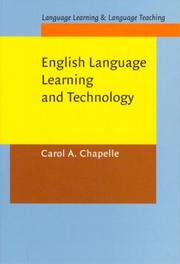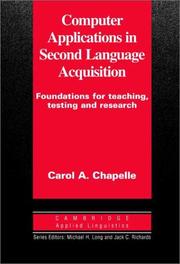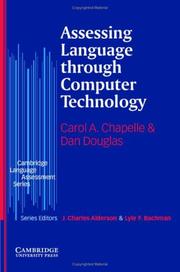| Listing 1 - 10 of 18 | << page >> |
Sort by
|

ISBN: 9027217033 1588114473 9027217041 1282254480 9027295956 1423762355 9786612254482 1588114481 9781588114471 9781588114488 Year: 2003 Volume: 7 Publisher: Amsterdam Benjamins
Abstract | Keywords | Export | Availability | Bookmark
 Loading...
Loading...Choose an application
- Reference Manager
- EndNote
- RefWorks (Direct export to RefWorks)
This book explores implications for applied linguistics of recent developments in technologies used in second language teaching and assessment, language analysis, and language use. Focusing primarily on English language learning, the book identifies significant areas of interplay between technology and applied linguistics, and it explores current perspectives on perennial questions such as how theory and research on second language acquisition can help to inform technology-based language learning practices, how the multifaceted learning accomplished through technology can be evaluated, and how theoretical perspectives can offer insight on data obtained from research on interaction with and through technology. The book illustrates how the interplay between technology and applied linguistics can amplify and expand applied linguists’ understanding of fundamental issues in the field. Through discussion of computer-assisted approaches for investigating second language learning tasks and assessment, it illustrates how technology can be used as a tool for applied linguistics research.
English language --- English teachers --- Educational technology --- Information technology --- English Language --- English --- Languages & Literatures --- Study and teaching --- Foreign speakers --- Technological innovations --- Training of --- 800.515 --- 802.0-07 --- Computerondersteunend (taal)onderwijs. Computer Assisted Language Learning --- Engels: taalonderwijs; taalverwerving --- 802.0-07 Engels: taalonderwijs; taalverwerving --- 800.515 Computerondersteunend (taal)onderwijs. Computer Assisted Language Learning --- Educational technology. --- Information technology. --- Foreign speakers. --- Technological innovations. --- Training of. --- Second language acquisition --- Applied linguistics --- Anglais (Langue) --- Langue seconde --- Technologie éducative --- Linguistique appliquée --- Computer-assisted instruction for foreign speakers --- Research --- Etude et enseignement --- Allophones --- Enseignement assisté par ordinateur pour allophones --- Acquisition --- Recherche --- Instructional technology --- Technology in education --- IT (Information technology) --- EFL (Language study) --- English as a foreign language --- English as a second language --- English to speakers of other languages --- ESL (Language study) --- ESOL (Language study) --- Teaching English as a second language --- TEFL (Language study) --- TESL (Language study) --- Teacher training --- Foreign students --- Technology --- Educational innovations --- Instructional systems --- Teaching --- Germanic languages --- Telematics --- Information superhighway --- Knowledge management --- Aids and devices --- English language - Study and teaching - Foreign speakers --- English language - Study and teaching - Technological innovations --- English teachers - Training of --- CALL --- English linguistics --- Language learning
Book
ISBN: 9781405194730 1405194731 Year: 2012 Publisher: Chichester : Wiley-Blackwell,
Abstract | Keywords | Export | Availability | Bookmark
 Loading...
Loading...Choose an application
- Reference Manager
- EndNote
- RefWorks (Direct export to RefWorks)
Applied linguistics --- Linguistique appliquée --- Encyclopedias. --- Encyclopédies --- Linguistique appliquée --- Encyclopédies --- Toegepaste linguïstiek --- Encyclopedieën. --- Applied linguistics - Encyclopedias.

ISBN: 0521626463 9780521626460 9781139524681 9780521626378 Year: 2001 Publisher: Cambridge Cambridge University press
Abstract | Keywords | Export | Availability | Bookmark
 Loading...
Loading...Choose an application
- Reference Manager
- EndNote
- RefWorks (Direct export to RefWorks)
Applied linguistics. --- Second language acquisition --- English language --- Computer-assisted instruction. --- Study and teaching --- Computer-assisted instruction for foreign speakers. --- Applied linguistics --- Second language learning --- Language acquisition --- Germanic languages --- Linguistics --- Study and teaching&delete& --- Computer-assisted instruction for foreign speakers --- Computer-assisted instruction --- Second language acquisition - Computer-assisted instruction. --- English language - Study and teaching - Computer-assisted instruction for foreign speakers.
Book
ISBN: 1137495987 1137495995 Year: 2016 Publisher: London : Palgrave Macmillan UK : Imprint: Palgrave Macmillan,
Abstract | Keywords | Export | Availability | Bookmark
 Loading...
Loading...Choose an application
- Reference Manager
- EndNote
- RefWorks (Direct export to RefWorks)
This book demonstrates how foreign language textbook analysis can inform future materials development to improve foreign language teaching. Through chronological analysis of French textbooks in the United States, this book explores the representations of Canada and Quebec in French beginner textbooks produced from 1960 to 2010. Chapelle couples a large collection of 65 textbooks with a social-semiotic qualitative analysis of the genres, language and images that communicate Quebec's cultural narrative to learners. Findings about the amount and type of content are presented by decade to track the trends in foreign language teaching and changes in Quebec’s representation. Particular attention is given to how language politics is presented to students through text and images. This book will be of interest to scholars of Canadian Studies, Quebec Studies and Second Language Acquisition, as well as foreign language materials developers. Carol A. Chapelle is Distinguished Professor of Liberal Arts and Sciences at Iowa State University. She is editor of the Encyclopedia of Applied Linguistics (2013), co-editor of the Cambridge Applied Linguistics Series, past president of the American Association for Applied Linguistics, and former editor of TESOL Quarterly.
Linguistics. --- Romance languages. --- Language and education. --- Teaching. --- Language and languages --- Cultural studies. --- Romance Languages. --- Language Teaching. --- Cultural Studies. --- Linguistics, general. --- Teaching and Teacher Education. --- Language Education. --- Study and teaching. --- Culture --- Cultural studies --- Foreign language study --- Language and education --- Language schools --- Language and languages-Study and. --- Language and languages. --- Foreign languages --- Languages --- Anthropology --- Communication --- Ethnology --- Information theory --- Meaning (Psychology) --- Philology --- Linguistics --- Neo-Latin languages --- Italic languages and dialects --- Language and languages—Study and teaching. --- Educational linguistics --- Education --- Didactics --- Instruction --- Pedagogy --- School teaching --- Schoolteaching --- Instructional systems --- Pedagogical content knowledge --- Training --- Linguistic science --- Science of language --- Canada. --- United States. --- AB --- ABSh --- Ameerika Ühendriigid --- America (Republic) --- Amerika Birlăshmish Shtatlary --- Amerika Birlăşmi Ştatları --- Amerika Birlăşmiş Ştatları --- Amerika ka Kelenyalen Jamanaw --- Amerika Qūrama Shtattary --- Amerika Qŭshma Shtatlari --- Amerika Qushma Shtattary --- Amerika (Republic) --- Amerikai Egyesült Államok --- Amerikanʹ Veĭtʹsėndi͡avks Shtattn --- Amerikări Pĕrleshu̇llĕ Shtatsem --- Amerikas Forenede Stater --- Amerikayi Miatsʻyal Nahangner --- Ameriketako Estatu Batuak --- Amirika Carékat --- AQSh --- Ar. ha-B. --- Arhab --- Artsot ha-Berit --- Artzois Ha'bris --- Bí-kok --- Ē.P.A. --- EE.UU. --- Egyesült Államok --- ĒPA --- Estados Unidos --- Estados Unidos da América do Norte --- Estados Unidos de América --- Estaos Xuníos --- Estaos Xuníos d'América --- Estatos Unitos --- Estatos Unitos d'America --- Estats Units d'Amèrica --- Ètats-Unis d'Amèrica --- États-Unis d'Amérique --- Fareyniḳṭe Shṭaṭn --- Feriene Steaten --- Feriene Steaten fan Amearika --- Forente stater --- FS --- Hēnomenai Politeiai Amerikēs --- Hēnōmenes Politeies tēs Amerikēs --- Hiwsisayin Amerikayi Miatsʻeal Tērutʻiwnkʻ --- Istadus Unidus --- Jungtinės Amerikos valstybės --- Mei guo --- Mei-kuo --- Meiguo --- Mî-koet --- Miatsʻyal Nahangner --- Miguk --- Na Stàitean Aonaichte --- NSA --- S.U.A. --- SAD --- Saharat ʻAmērik --- SASht --- Severo-Amerikanskie Shtaty --- Severo-Amerikanskie Soedinennye Shtaty --- Si͡evero-Amerikanskīe Soedinennye Shtaty --- Sjedinjene Američke Države --- Soedinennye Shtaty Ameriki --- Soedinennye Shtaty Severnoĭ Ameriki --- Soedinennye Shtaty Si͡evernoĭ Ameriki --- Spojené obce severoamerick --- Spojené staty americk --- SShA --- Stadoù-Unanet Amerika --- Stáit Aontaithe Mheirice --- Stany Zjednoczone --- Stati Uniti --- Stati Uniti d'America --- Stâts Unîts --- Stâts Unîts di Americhe --- Steatyn Unnaneysit --- Steatyn Unnaneysit America --- SUA --- Sŭedineni amerikanski shtati --- Sŭedinenite shtati --- Tetã peteĩ reko Amérikagua --- U.S. --- U.S.A. --- United States of America --- Unol Daleithiau --- Unol Daleithiau America --- Unuiĝintaj Ŝtatoj de Ameriko --- US --- USA --- Usono --- Vaeinigte Staatn --- Vaeinigte Staatn vo Amerika --- Vereinigte Staaten --- Vereinigte Staaten von Amerika --- Verenigde State van Amerika --- Verenigde Staten --- VS --- VSA --- Wááshindoon Bikéyah Ałhidadiidzooígí --- Wilāyāt al-Muttaḥidah --- Wilāyāt al-Muttaḥidah al-Amirīkīyah --- Wilāyāt al-Muttaḥidah al-Amrīkīyah --- Yhdysvallat --- Yunaeted Stet --- Yunaeted Stet blong Amerika --- ZDA --- Združene države Amerike --- Zʹi͡ednani Derz͡havy Ameryky --- Zjadnośone staty Ameriki --- Zluchanyi͡a Shtaty Ameryki --- Zlucheni Derz͡havy --- ZSA --- Canada (Province) --- Canadae --- Ceanada --- Chanada --- Chanadey --- Dominio del Canad --- Dominion of Canada --- Jianada --- Kʻaenada --- Kanada --- Ḳanadah --- Kanadaja --- Kanadas --- Ḳanade --- Kanado --- Kanak --- Province of Canada --- Republica de Canad --- Yn Chanadey --- ABŞ --- Amerikanʹ Veĭtʹsėndi͡avks Shtattnė --- É.-U. --- ÉU --- Saharat ʻAmērikā --- Spojené obce severoamerické --- Spojené staty americké --- Stáit Aontaithe Mheiriceá --- Wááshindoon Bikéyah Ałhidadiidzooígíí --- Dominio del Canadá --- Kaineḍā --- Kanakā --- Republica de Canadá

ISBN: 9780521840217 0521549493 052184021X 9780521549493 9780511733116 0511733119 Year: 2006 Publisher: Cambridge Cambridge University Press
Abstract | Keywords | Export | Availability | Bookmark
 Loading...
Loading...Choose an application
- Reference Manager
- EndNote
- RefWorks (Direct export to RefWorks)
In 1998 and 1999, three of the largest providers of educational tests introduced computer-based versions of proficiency tests for English as a foreign language. Around the same time, many institutions began to offer Web-based tests for particular language courses and classes. These two phenomena have greatly added to the momentum of work in computer-assisted testing and mean that assessment through computer technology is becoming a fact for language learners in educational settings and therefore for teachers and researchers. This book is the first to consider the theoretical, methodological and practical issues and their implications for language-teaching professionals wishing to engage with computer-assisted assessment. It overviews the work in the field, evaluates examples of assessment though computer technology, and provides language teachers and researchers with practical guidelines for implementation.
Didactics of secundary education --- Didactics of English --- Engels --- gebruik van ICT --- tests met computers --- competentiegericht evalueren met computers --- gebruik van ICT. --- tests met computers. --- competentiegericht evalueren met computers. --- 800.515 --- 800.515 Computerondersteunend (taal)onderwijs. Computer Assisted Language Learning --- Computerondersteunend (taal)onderwijs. Computer Assisted Language Learning --- Language and languages --- Foreign languages --- Languages --- Anthropology --- Communication --- Ethnology --- Information theory --- Meaning (Psychology) --- Philology --- Linguistics --- Ability testing&delete& --- Data processing --- Taal en talen --- Vreemdetalenonderwijs --- Ability testing --- Data processing. --- didactiek --- Langage et langues --- Tests d'aptitude --- Informatique
Book
ISBN: 9781544334486 1544334494 1544334486 1544334478 154433446X 1071878816 1071878816 Year: 2021 Volume: 184 Publisher: Los Angeles, Calif. Sage
Abstract | Keywords | Export | Availability | Bookmark
 Loading...
Loading...Choose an application
- Reference Manager
- EndNote
- RefWorks (Direct export to RefWorks)
Carol A. Chapelle shows readers how to design validation research for tests of human capacities and performance. Any test that is used to make decisions about people or programs should have undergone extensive research to demonstrate that the scores are actually appropriate for their intended purpose. Argument-Based Validation in Testing and Assessment is intended to help close the gap between theory and practice, by introducing, explaining, and demonstrating how test developers can formulate the overall design for their validation research from an argument-based perspective.
Quantitative methods in social research --- Examinations --- Educational tests and measurements --- Psychological tests --- Validity. --- Evaluation. --- #SBIB:303H12 --- Methoden en technieken: sociale wetenschappen --- Examinations - Validity. --- Educational tests and measurements - Evaluation. --- Psychological tests - Evaluation.

ISBN: 0521626374 0521626463 1139524682 Year: 2001 Publisher: Cambridge Cambridge University Press
Abstract | Keywords | Export | Availability | Bookmark
 Loading...
Loading...Choose an application
- Reference Manager
- EndNote
- RefWorks (Direct export to RefWorks)
Computer Applications in Second Language Acquisition explores computer applications in second language acquisition by reviewing and interpreting research and development in three areas: computer-assisted second language learning, computer-assisted second language assessment, and computer-assisted second language research addressing issues such as effective use of software in language teaching, values and limitations of computer-assisted testing, and the study of second language development with interactive computer programs. It offers a unique view of the topic by examining computer applications through perspectives from applied linguistics; it identifies cross-disciplinary work relevant to software development, use, and evaluation; and it suggests critical research directions. This is the first single volume on computer applications in the field which includes issues in teaching, assessment, and SLA research, and which treats evaluation extensively.
Computer assisted instruction --- Didactics of languages --- Psycholinguistics --- English language --- Applied linguistics. --- Second language acquisition --- Second language learning --- Language acquisition --- Linguistics --- Germanic languages --- Study and teaching --- Computer-assisted instruction for foreign speakers. --- Data processing.
Book
ISBN: 9781119147367 Year: 2020 Publisher: Chichester Wiley Blackwell
Abstract | Keywords | Export | Availability | Bookmark
 Loading...
Loading...Choose an application
- Reference Manager
- EndNote
- RefWorks (Direct export to RefWorks)
Digital
ISBN: 9781137495990 Year: 2016 Publisher: London Palgrave Macmillan
Abstract | Keywords | Export | Availability | Bookmark
 Loading...
Loading...Choose an application
- Reference Manager
- EndNote
- RefWorks (Direct export to RefWorks)
This book demonstrates how foreign language textbook analysis can inform future materials development to improve foreign language teaching. Through chronological analysis of French textbooks in the United States, this book explores the representations of Canada and Quebec in French beginner textbooks produced from 1960 to 2010. Chapelle couples a large collection of 65 textbooks with a social-semiotic qualitative analysis of the genres, language and images that communicate Quebec's cultural narrative to learners. Findings about the amount and type of content are presented by decade to track the trends in foreign language teaching and changes in Quebec’s representation. Particular attention is given to how language politics is presented to students through text and images. This book will be of interest to scholars of Canadian Studies, Quebec Studies and Second Language Acquisition, as well as foreign language materials developers. Carol A. Chapelle is Distinguished Professor of Liberal Arts and Sciences at Iowa State University. She is editor of the Encyclopedia of Applied Linguistics (2013), co-editor of the Cambridge Applied Linguistics Series, past president of the American Association for Applied Linguistics, and former editor of TESOL Quarterly.
Sociology of culture --- Teacher education. Teacher's profession --- Teaching --- Didactics of languages --- Educational sciences --- Linguistics --- Romance languages --- cultuur --- talenonderwijs --- linguïstiek --- lerarenopleiding --- lesgeven
Digital
ISBN: 9781405198431 Year: 2012 Publisher: Place of publication unknown Wiley
Abstract | Keywords | Export | Availability | Bookmark
 Loading...
Loading...Choose an application
- Reference Manager
- EndNote
- RefWorks (Direct export to RefWorks)
| Listing 1 - 10 of 18 | << page >> |
Sort by
|

 Search
Search Feedback
Feedback About UniCat
About UniCat  Help
Help News
News